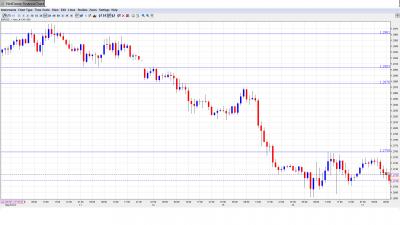Euro/dollar edged upwards from yesterday’s (May 16th) levels, but the markets remain nervous about the political crisis in Greece. A caretaker government will run the country until elections in June. The possibility of a Greek exit could undermine the Euro-zone and affect countries like Spain and Italy. The European markets will looking to catch their breath and enjoy a quieter day, with bank holidays in France and Germany and no Euro-zone releases scheduled. There are two key releases today in the US, Unemployment Claims and the Philly Fed Manufacturing Index.
Here’s an update on technicals, fundamentals and what’s going on in the markets.
EUR/USD Technicals
- Asian session: EUR/USD moved up as high as 1.2749, and consolidated at 1.2740. The pair has lost some ground in the European session, trading at 1.2715.
- Current range: 1.2660 to 1.2760.
- Further levels in both directions: Below: 1.2660, 1.2623 and 1.2587.
- Above: 1.2760, 1.2873, 1.29, 1.2960, 1.30, 1.3050, 1.3110, 1.3165, 1.3212, 1.33 and 1.34.
- For a second week in a row, a weekend gap is seen. This gap wasn’t closed quickly (again) and this is a bearish sign.
- 1.2760 is providing weak resistance to the pair.
- 1.2660 is the next line below, and is providing strong support.
Euro/Dollar has steadied – click on the graph to enlarge.
EUR/USD Fundamentals
- 12:30 US Unemployment Claims. Exp. 368K.
- 12:30 Treasury Sec Geithner Speaks.
- 14:00 Philly Fed Manufacturing Index. Exp. +10.3 points. See how to trade this event with EUR/USD.
- 14:00 CB Leading Index. Exp. +0.1%.
For more events later in the week, see the Euro to dollar forecast
EUR/USD Sentiment
- Elections in Greece – the Sequel: After marathon talks failed to produce a coalition government, Greeks will return to the polls on June 17. The SYRIZA party, which campaigned against the bailout and is running high in the polls, could gain more seats in the upcoming election. Will Greece simply walk away from the interantional aid package? If this nightmarish scenario unfolds, a senior European analyst has warned that the country may simply run out of money and descend into chaos.
- Markets jittery on talk of Grexit: With the situation in Greece looking to spin out of control, nervous depositors have been withdrawing their deposits from Greek banks. German finance minister Wolfgang Schäuble bluntly told Greece that it has must between staying or leaving, and his ministry is preparing for the possibility of Greece leaving the euro-zone and the euro. World Bank President Robert Zoellick said that a Greek exit could undermine confidence in the Euro-zone and lead to (yet) another liquidity crisis. In a further development, the ECB has stopped providing liquidity to several Greek banks as they are severely undercapitalized, and has shifted them to an emergency liquidity assistance program. These types of statements and actions could further weigh on the fragile euro.
- More Pain in Spain: Almost lost in all the dramatic developments in Greece is the ominous situation in Spain. The country has officially slipped into recession, after GDP contracted by 0.3% in Q1. Only days after Spain nationalized Bankia and introduced new measures for the banking system, it was revealed that a plan C for a worsening situation is underway. Spanish 10 year bond yields are leaping to 6.26%, with the spread from German benchmark bunds reaching 4.77% – these are extreme levels. With a huge debt and straggering unemployment, things look grim indeed.
- Merkel and Hollande Meet: François Hollande kicked off his brand new presidency by flying to Berlin to meet with Angela Merkel. It was an inauspicious start, as Hollande’s plane was struck by lightning, delaying the leaders’ meeting. The situation in Europe is rapidly deterioriating, so the leaders of the two biggest economies in the Eurozone will have to put aside their differences and take some joint action to try and rescue a beleaguered Euro-zone. With Merkel favoring austerity and Hollande promoting growth, it clearly is not a match made in heaven.
- Deeper Recession in Europe: The mood in Europe is gloomy, and heavyweights like the UK, Italy and Spain are all struggling with weak economies. Recent Euro-zone releases have generally been weak, and further disappointing economic data is likely to send the euro tumbling some more.
- US Economy Improving (slowly) : The data from the US is mixed, but still pointing to growth, contrary to the old continent. Employment figures have improved somewhat, but other key indicators, such as Retail Sales were weak. If the markets see figures pointing to sustained growth in the US, the dollar could make further inroads against the embattled euro.
- Fed Standing Pat: Balance sheet measures are still on the cards (QE3) according to the Bernanke, but a significant deflation or no growth can revive the chances of more dollar printing. QE3 is currently on the back burner, although the Fed keeps declaring (to anyone still listening) that “all options remain on the table”. A passive monetary policy of low interest rates for the foreseeable future may not make for dramatic moves in market, but it is supportive for the greenback, which has benefited from the turmoil and uncertainty gripping Europe.

